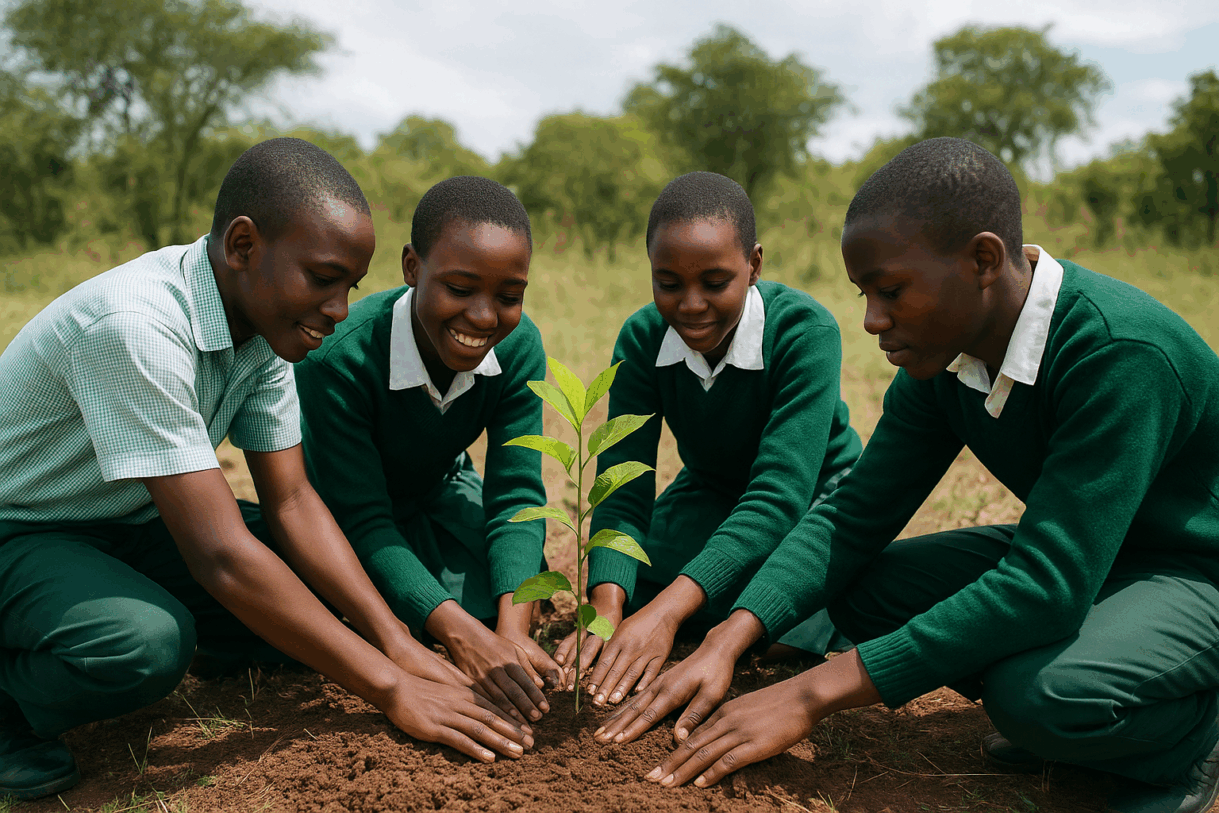
simply amazing, always for you.
Table of Contents
- Kenya at the Forefront of Sustainability
- The Foundations of Kenya’s Green Vision
- Renewable Energy: Powering a Nation Sustainably
- Geothermal Power: Tapping into Earth’s Energy
- Hydropower and Wind: Complementary Green Solutions
- Solar Expansion: Lighting Homes and Cities
- The Road to Universal Access: Clean Cooking and Off-Grid Solutions
- Waste Management and the Push Toward Zero-Waste Cities
- Sustainable Agriculture and Food Systems
- Urban Design, Green Buildings, and Eco-Friendly Homes
- Policy and Governance Driving Sustainability
- Cultural Shifts: How Kenyans are Embracing Sustainable Living
- Challenges on the Path to a Greener Future
- Opportunities: Why Kenya Can Become Africa’s Sustainability Model
- Conclusion: Building a Legacy of Green Leadership
1. Kenya at the Forefront of Sustainability
Sustainability is no longer a distant aspiration — it is a survival strategy. For nations in Africa, where climate change has already begun to alter rainfall patterns, reduce food security, and strain resources, the urgency is even greater. Among African countries, Kenya has emerged as a leader in charting a sustainable path forward.

From its heavy reliance on renewable energy to grassroots recycling movements, Kenya is demonstrating that sustainable living can be woven into the fabric of daily life. Unlike many countries that treat sustainability as an optional add-on, Kenya integrates it into policy, infrastructure, and community initiatives.

This article explores in depth how Kenya is leading Africa’s sustainable future. We will look at renewable energy, waste management, sustainable agriculture, urban design, and the policies driving change — while also considering the challenges and opportunities that lie ahead.

2. The Foundations of Kenya’s Green Vision
Kenya’s commitment to sustainability is not accidental. It is rooted in three main foundations:
- Abundant natural resources such as geothermal heat, fertile soils, rivers, and abundant sunshine.
- Policy direction that aligns with global climate commitments like the Paris Agreement and the United Nations Sustainable Development Goals (SDGs).
- A young, environmentally conscious population that is increasingly aware of the need to protect ecosystems while innovating new solutions.
The government’s Vision 2030 framework emphasizes a low-carbon growth trajectory, while Kenya’s National Climate Change Action Plan outlines adaptation and mitigation strategies. Together, these frameworks create a roadmap for a sustainable economy.
3. Renewable Energy: Powering a Nation Sustainably
One of the most visible areas where Kenya has taken the lead is renewable energy. Currently, more than 85% of Kenya’s electricity comes from renewable sources, making it one of the cleanest energy mixes in the world.
Geothermal Power: Tapping into Earth’s Energy
Kenya sits on the geologically active East African Rift Valley, giving it access to vast geothermal resources. This has been harnessed to produce over 800 MW of electricity, making Kenya the largest producer of geothermal energy in Africa.
Geothermal is reliable, available day and night, and less vulnerable to seasonal variations compared to hydropower. It has become the backbone of Kenya’s energy system and continues to expand.
Hydropower and Wind: Complementary Green Solutions
Hydropower remains important in Kenya’s energy mix, though droughts linked to climate change have reduced its reliability. To balance this, Kenya has invested in wind power, particularly in northern regions where strong, consistent winds can generate significant electricity.

The combination of geothermal, wind, and hydro makes Kenya’s grid remarkably green compared to most developing countries.
Solar Expansion: Lighting Homes and Cities
With abundant sunshine year-round, solar energy is a natural solution for Kenya. While utility-scale solar is growing, the most transformative change has been decentralized solar solutions. Millions of rural households now rely on small solar kits to light their homes, charge phones, and power small appliances.
This has provided access to electricity for communities far from the national grid, reducing dependence on kerosene lamps and cutting household energy costs.
4. The Road to Universal Access: Clean Cooking and Off-Grid Solutions
Energy is not only about electricity; it is also about cooking. In Kenya, traditional fuels like firewood and charcoal have long been used, contributing to deforestation and indoor air pollution. To counter this, Kenya has rolled out the National Clean Cooking Strategy, aiming for universal access to clean cooking solutions by 2028.
Efforts include promoting LPG, electric cooking, and energy-efficient stoves. At the same time, off-grid solar systems and mini-grids continue to expand access to power, ensuring that even remote areas can benefit from modern energy without relying on fossil fuels.
5. Waste Management and the Push Toward Zero-Waste Cities
Kenya made international headlines in 2017 when it implemented one of the world’s strictest bans on plastic bags. This bold step signaled a strong commitment to reducing plastic pollution.
Today, waste management has evolved into broader efforts toward circular economy models. Communities are increasingly involved in sorting, recycling, and reusing materials. Zero-waste initiatives, recycling banks, and urban composting are gradually becoming part of urban culture.
Kenya’s vision is not only to manage waste but to turn it into an economic opportunity. Recycling industries are emerging that reduce landfill pressure while creating jobs for youth and women.
6. Sustainable Agriculture and Food Systems
Agriculture is the backbone of Kenya’s economy, employing a majority of the population. Sustainable living cannot be achieved without transforming how food is grown, distributed, and consumed.
Key strategies include:
- Climate-smart agriculture, such as drought-resistant crops and irrigation efficiency.
- Organic farming that reduces reliance on chemical fertilizers and pesticides.
- Agroforestry, which integrates trees into farming systems, improving soil fertility and providing shade.
- Urban farming, where city residents use rooftops, balconies, and small plots to grow food, reducing dependence on imported produce.
These approaches not only protect the environment but also improve food security.
7. Urban Design, Green Buildings, and Eco-Friendly Homes
As Kenya urbanizes rapidly, sustainable city design has become critical. Modern developments increasingly incorporate:
- Solar water heating and rooftop solar panels.
- Rainwater harvesting systems for water conservation.
- Natural ventilation and lighting to reduce energy use.
- Green spaces that support biodiversity and improve mental health.
Eco-conscious architecture is moving from luxury estates to mainstream housing projects, signaling a shift in consumer demand toward sustainability.
8. Policy and Governance Driving Sustainability
Kenya’s leadership in sustainability is backed by strong policy frameworks. Key drivers include:
- Vision 2030, which emphasizes green growth.
- The Climate Change Act (2016), which established the Climate Change Council to oversee policies.
- National Climate Change Action Plan, setting adaptation and mitigation priorities.
- Plastic bans and waste management policies that hold producers accountable.
Kenya also actively participates in regional and global forums, positioning itself as a voice for Africa in climate negotiations.
9. Cultural Shifts: How Kenyans are Embracing Sustainable Living
Beyond policy, cultural change is essential. Across Kenya, sustainability is becoming a lifestyle choice:
- Young people are leading clean-up campaigns and promoting zero waste.
- Families are adopting reusable shopping bags, refillable containers, and eco-friendly products.
- Education curricula increasingly integrate environmental awareness, preparing the next generation for responsible living.
These shifts show that sustainability is no longer seen as an elite concept but as a shared responsibility.
10. Challenges on the Path to a Greener Future
Despite the progress, challenges remain:
- Urban waste management is still inadequate in many cities.
- Financing gaps hinder large-scale renewable and infrastructure projects.
- Climate vulnerability, with frequent droughts and floods, threatens progress.
- Behavioral change takes time, as some communities remain attached to unsustainable practices like charcoal use.
Addressing these challenges will require sustained investment, public education, and stronger enforcement of environmental regulations.
11. Opportunities: Why Kenya Can Become Africa’s Sustainability Model
Kenya’s achievements offer valuable lessons for the continent:
- Its renewable energy mix shows that clean energy is possible in Africa.
- Its strict plastic bans demonstrate the power of strong policy.
- Its grassroots recycling and clean energy solutions show how communities can drive change.
If Kenya continues on this path, it could not only achieve its own sustainability goals but also inspire neighboring countries to adopt similar models.
12. Building a Legacy of Green Leadership
Kenya’s journey toward sustainability is not complete, but it is already a story of leadership and innovation. From renewable energy to zero-waste initiatives, the country is proving that a sustainable future is achievable in Africa.
By balancing policy, innovation, and cultural shifts, Kenya is laying the foundation for a greener tomorrow. Its vision is not just about reducing emissions or managing waste — it is about creating a society where economic growth, environmental protection, and social well-being go hand in hand.
Kenya is not simply adapting to sustainability. It is leading Africa’s sustainable future, setting an example for the world.
SUGGESTED READS
- Youth and the 2027 Elections: How Young Voters Could Shape the Next General Election in Kenya
- RutonomicsAt3 — The True State of William Ruto’s Economic Legacy After 3 Years
- Living with a Shared Secret: Psychological Consequences for Couples
- How Rumors Shape and Destroy Trust in Marriages
- The Link Between Rage, Violence, and Betrayal in Intimate Relationships

Support Our Website!
We appreciate your visit and hope you find our content valuable. If you’d like to support us further, please consider contributing through the TILL NUMBER: 9549825. Your support helps us keep delivering great content!
If you’d like to support Nabado from outside Kenya, we invite you to send your contributions through trusted third-party services such as Remitly, western union, SendWave, or WorldRemit. These platforms are reliable and convenient for international money transfers.
Please use the following details when sending your support:
Phone Number: +254701838999
Recipient Name: Peterson Getuma Okemwa
We sincerely appreciate your generosity and support. Thank you for being part of this journey!

Thank you for your sharing. I am worried that I lack creative ideas. It is your article that makes me full of hope. Thank you. But, I have a question, can you help me?